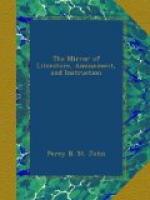so exactly resembled his own, that, such is the sympathetic
power of misfortune, they formed a mutual attachment
almost as soon as they came in contact. Both
were pedestrians bound to London, and both were equally
destitute of money or friends; and one
honest
mode only remained for them to pursue, which was,
to address themselves to “the charitable and
humane.” This point being settled, it was
agreed to take their turn in begging along the road;
and in this manner they reached London, without having
any reason to complain of neglect, or that there was
any lack of generous and disinterested feeling in the
human species. Ledyard’s first object,
after arriving in the metropolis, was to find out
his rich relations, in which he was so far successful
as to discover the residence of a wealthy merchant
of the same name, to whose house he hastened.
The gentleman was from home; but the son listened to
his story, and plainly told him he could put no faith
in his representations, as he had never heard of any
relations in America. He pressed him, however,
to remain till his father’s return, but the
suspicion of his being an impostor roused his indignation
to such a pitch that he abruptly left the house and
resolved never to go near it again. It is said
that this merchant, on further inquiry, was satisfied
of the truth of the connexion, and sent for Ledyard,
who declined the invitation in no very gracious manner;
that, notwithstanding all this, the merchant afterwards,
on hearing of his distressed situation, sent him money;
and that the money was also rejected with disdain by
the American, who desired the bearer to carry it back,
and tell his master that he belonged not to the race
of the Ledyards.
The next capacity in which we find Ledyard is that
of a corporal of marines, on board the ship of Captain
Cook, then preparing for his third and last voyage
round the world. Of this voyage Ledyard is said
to have kept a minute journal, which, as in all cases
of voyages of discovery, went among the rest to the
Admiralty, and was never restored. Two years
afterwards, Ledyard, with the assistance of a brief
outline of the voyage published in London, and from
his own recollection, brought out, in a small duodecimo,
his narrative of the principal transactions of the
voyage, in which, we hear (for we have never seen it)
he blames the officers, and Captain Cook in particular,
for several instances of precipitate and incautious
conduct, not to say severity, towards the various
natives with whom they were brought in contact.
It was to this want of caution, and a due consideration
for the habits and feelings of the Sandwich Islanders,
that he imputed the death of this celebrated navigator.
The late Admiral Burney, who served as a lieutenant
on the voyage, says that, “with an ardent disposition,
Ledyard had a passion for lofty sentiment and description.”
He adds that, after Cook’s death, Ledyard proffered
his services to Captain Clarke, to undertake the office
of historiographer of the expedition, and presented
a specimen descriptive of the manners of the Society
Islanders; “but,” says this author, “his
ideas were thought too sentimental, and his language
too florid.”




